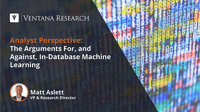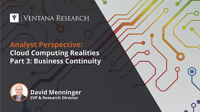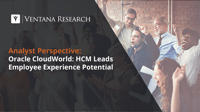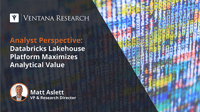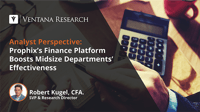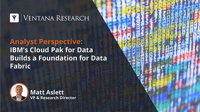Vena Solutions offers organizations a platform for financial planning, analysis and reporting as well as software to manage accounting consolidation and close processes. From the start, Vena has designed its applications to meet the needs of midsize organizations, which typically have the same requirements as large enterprises but with significantly fewer resources to acquire, manage and maintain technology. Ventana Research named Vena a Value Index Leader in Adaptability and a Vendor of Merit...
Read More
Topics:
Office of Finance,
Business Planning,
Financial Performance Management,
digital finance
In today’s data-driven world, organizations need real-time access to up-to-date, high-quality data and analysis to keep pace with changing market dynamics and make better strategic decisions. By mining meaningful insights from enterprise data quickly, they gain a competitive advantage in the market. Yet, organizations face a multitude of challenges when transitioning into an analytics-driven enterprise. Our Analytics and Data Benchmark Research shows that more than one-quarter of organizations...
Read More
Topics:
embedded analytics,
Analytics,
Business Intelligence,
IBM,
IBM Watson,
AI & Machine Learning
The theme of this year’s Oracle NetSuite SuiteWorld was “Full Suite Ahead,” with content aimed at demonstrating to customers (and prospective buyers) the value of using more of what NetSuite has to offer. The business logic behind this concept goes beyond the obvious objective of upselling existing customers to increase the average annual recurring revenue. As is often the case with subscription businesses, customers fail to take advantage of what’s already included in their service. Ensuring...
Read More
Topics:
Office of Finance,
ERP and Continuous Accounting,
digital finance,
Finance Performance Management
The pandemic years saw an exponential rise in organizational investment in digital learning, and for good reason. With in-person learning no longer an option, organizations were forced to quickly adapt to the changing world of work in order to ensure workers were prepared with the knowledge and training necessary to operate in ways they had never before seen. Beyond operational imperatives, organizations have turned to digital learning systems to find new ways to track and bolster productivity,...
Read More
Topics:
Human Capital Management,
Learning Management
Almost all organizations are investing in data science, or planning to, as they seek to encourage experimentation and exploration to identify new business challenges and opportunities as part of the drive toward creating a more data-driven culture. My colleague, David Menninger, has written about how organizations using artificial intelligence and machine learning (AI/ML) report gaining competitive advantage, improving customer experiences, responding faster to opportunities and threats, and...
Read More
Topics:
Data Governance,
Data Management,
Data,
data operations,
AI & Machine Learning,
Analytics & Data,
Analytic Data Platforms
In my previous perspectives on cloud computing, I addressed some of the realities of cloud costs as well as hybrid and multi-cloud architectures. In the midst of the pandemic, my colleague, Mark Smith, authored a series of perspectives on considerations for business continuity in general, beginning with this look at some of the investments organizations must make to mitigate the risk of business disruptions. In this perspective, I’d like to address some of the realities of business continuity...
Read More
Topics:
Business Continuity,
Cloud Computing,
Digital Technology,
Digital Business
The starting point of an era is never precise and rarely conforms to neat calendar delineations. For example, the start of the 20th century is associated with the outbreak of war in 1914. So I expect that decades from now, the consensus will hold that what became known as the 21st century began in the year 2020, with the pandemic serving as a catalyst that accelerated already existing trends and forced changes to prevailing norms and practices. This and other disruptive events that have...
Read More
Topics:
Office of Finance,
Business Intelligence,
Business Planning,
Financial Performance Management,
digital finance,
AI & Machine Learning,
profitability management,
operational data platforms
IBM Planning Analytics with Watson is a comprehensive, cloud-based business planning application that supports what Ventana Research calls integrated business planning. We coined this term in 2007 to describe a high-participation approach to business planning that integrates strategy, operations and finance. Our Next Generation Business Planning Benchmark Research demonstrated the value of IBP: Organizations that link planning processes get better results. Sixty-six percent of organizations...
Read More
Topics:
Predictive Analytics,
Office of Finance,
embedded analytics,
Business Intelligence,
Business Planning,
Financial Performance Management,
Watson,
Digital transformation,
digital finance,
AI & Machine Learning,
profitability management
The idea of partnerships in business is most definitely not new. Wholesaling through distributors and retailers is centuries old. For some industries, their entire model is selling and servicing through partners. Think auto parts, and the auto part stores visible in most neighborhoods. But what is new is that partnerships are moving beyond this reseller model towards product partnerships, where a seller’s products and services are supplemented by other vendors’ offerings from adjacent and...
Read More
Topics:
Subscription Management,
partner management,
Office of Revenue
It has been three years since Oracle hosted a CloudWorld event live in Las Vegas, and it is clear the time has not been wasted. With 12 new releases since the last event, the Oracle human capital management product team has made significant advances in both product and service. Three areas of note: Oracle HCM’s continued focus on personalization of experience, meeting the HCM needs of the healthcare industry and advancing the Oracle Cloud Recruiting offering.
Read More
Topics:
Human Capital Management
If you’ve ever been to London, you are probably familiar with the announcements on the London Underground to “mind the gap” between the trains and the platform. I suggest we also need to mind the gap between data and analytics. These worlds are often disconnected in organizations and, as a result, it limits their effectiveness and agility.
Read More
Topics:
embedded analytics,
Analytics,
Business Intelligence,
Data Governance,
Data Management,
data operations,
Analytics & Data
I have previously written about growing interest in the data lakehouse as one of the design patterns for delivering hydroanalytics analysis of data in a data lake. Many organizations have invested in data lakes as a relatively inexpensive way of storing large volumes of data from multiple enterprise applications and workloads, especially semi- and unstructured data that is unsuitable for storing and processing in a data warehouse. However, early data lake projects lacked structured data...
Read More
Topics:
Business Intelligence,
Data Governance,
Data Management,
Data,
AI & Machine Learning,
Streaming Data & Events,
Analytic Data Platforms
The door opened to a new world in 2020, one that renders old assumptions suspect and future outcomes more varied and uncertain. It’s likely that the transition to what’s next will be bumpy, which makes planning more effectively that much more strategic.
Read More
Topics:
Office of Finance,
Business Planning,
Financial Performance Management,
digital finance
Prophix offers cloud financial software for planning, budgeting, reporting and statutory financial consolidation designed to meet the requirements of midsize organizations and divisions of larger corporations. The company was one of the first to offer a planning platform capable of bringing together a company’s diverse planning processes and financial planning and budgeting. Its consolidation and close automation enable a shorter close and improved accounting staff productivity for midsize...
Read More
Topics:
Office of Finance,
Business Planning,
Financial Performance Management,
ERP and Continuous Accounting,
digital finance
For quite a few years now, two trends have put the contact center on a collision course. First, the technology used to handle customer inquiries has been evolving quickly, moving organizations farther and farther away from the traditional mode of primarily answering voice calls. At the same time, consumers have become much more demanding. There’s no doubt that customers are more likely to use quality of service as a gauge for whether they should continue doing business with an organization....
Read More
Topics:
Customer Experience,
Voice of the Customer,
Contact Center,
agent management,
Customer Experience Management,
Field Service,
customer service and support
I have written recently about the similarities and differences between data mesh and data fabric. The two are potentially complementary. Data mesh is an organizational and cultural approach to data ownership, access and governance. Data fabric is a technical approach to automating data management and data governance in a distributed architecture. There are various definitions of data fabric, but key elements include a data catalog for metadata-driven data governance and self-service, agile data...
Read More
Topics:
Business Intelligence,
Cloud Computing,
Data Governance,
Data Management,
Data,
data operations,
AI & Machine Learning,
operational data platforms
The worldwide market for software to manage indirect income taxes, which includes sales and use, goods and services (GST) and value-added taxes (VAT), has been growing because of recent compliance mandates, the growth of e-commerce as well as a desire to accelerate business processes by reducing friction in areas such as tax compliance, cutting administration costs and lowering risk. Vertex provides businesses with cloud-based software that manages indirect tax processes for midsize and larger...
Read More
Topics:
Office of Finance,
ERP and Continuous Accounting,
Revenue, Lease and Tax Accounting
ERP systems have been a fixture of organizational process management and record keeping for so long (more than three decades) that it is likely that few who use the software are aware that ERP is an acronym for Enterprise Resources Planning. Its smooth and uninterrupted functioning is essential to an organization’s accounting and finance processes. In manufacturing and distribution, ERP manages inventory and logistics. Some organizations use it to handle human resources functions like tracking...
Read More
Topics:
Office of Finance,
Financial Performance Management,
ERP and Continuous Accounting,
digital finance
Pressures to engage consumers through every interaction and provide a delightful customer experience are influencing advancements in business and technology. Organizations are challenged to manage friction points experienced by billions of consumers amid expanding digital channels. These issues must be addressed to engage and respond to customers every second of the day.
Read More
Topics:
Customer Experience,
Contact Center,
agent management,
Digital Business
Traditional key performance indicators used for performance measurement in contact centers are no longer sufficient. These outdated standards don’t reliably inform mid- and upper-level leadership about the true impact of agent work and behavior. Organizations should begin to expand the notion of what’s important in order to make the contact center a stronger organizational institution, more closely tied to others who impact the customer experience. Outside the contact center, people are keen to...
Read More
Topics:
Customer Experience,
Voice of the Customer,
data artisan,
Contact Center,
agent management,
Customer Experience Management,
Field Service,
customer service and support
Some weeks back I published my thoughts about the traditional applicant tracking system and how that technology is no longer sufficient to support organizations’ complex recruiting needs. This is particularly true when trying to take a one-size-fits-all approach to hiring processes. Having identical hiring processes and requirements for professional hires as for low-complexity, low barrier-to-entry roles will inevitably result in lost candidates, frustrated recruiters and hiring managers, and...
Read More
Topics:
Human Capital Management,
Talent Management
In their pursuit to be data-driven, organizations are collecting and managing more data than ever before as they attempt to gain competitive advantage and respond faster to worker and customer demands for more innovative, data-rich applications and personalized experiences. As data is increasingly spread across multiple data centers, clouds and regions, organizations need to manage data on multiple systems in different locations and bring it together for analysis. As the data volumes increase...
Read More
Topics:
Data Management,
Data,
data operations,
Analytic Data Platforms





